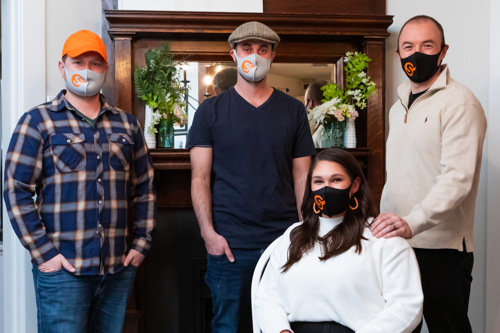High school friends establish fund amidst pandemic to broaden philanthropy
A passion for helping others and giving back is keeping a group of high school friends connected, though miles keep them apart.
Fifteen friends, most of whom are 2005 graduates of Westerville North High School, have experienced a lot together since they left high school behind, from weddings and babies to moving, travel, and now, a pandemic. The close-knit group decided it was time to formalize an idea they’d been thinking about: to pool their resources for giving, recognizing they could do more together than individually.
In 2020, they established the Cultivating Success Fund at the Foundation, a Donor Advised Fund that gives them the flexibility to support organizations both in central Ohio and in the communities where they live.
“2020 was a hard year for everyone. It made us realize that nothing is guaranteed. We’ve always wanted to help others, so why wait?”
JOANNA STUDEBAKER, ADVISOR, CULTIVATING SUCCESS FUND
“We have a total of 15 advisors to the fund,” explained Laura Hazzard. “Twelve of us met in high school and the remaining three advisors are spouses that have become friends with everyone in the group over the years.”
While seven advisors are local, six live in Los Angeles and two in Charlotte. Throughout the year, they are active in their respective communities, working to understand the greatest needs. They meet as a group four times a year to talk about what they have learned and discuss potential nonprofits that could benefit from a grant. Once they narrow down the nonprofits and projects, they put it to a vote.

Cultivating Success Fund advisors pictured (l–r): Micheal Ingersoll, Donny Murray, Megan Reamsnyder, and Jake Reamsnyder Advisors not pictured: Matt and Sam Becker, Meredith Casto, Joel Ehninger, Chris and Laura Hazzard, Angie Leggett, Britney Murray, Ed Skudder, and Colin and Joanna Studebaker
“As a large group, when we meet online, specific officers handle specific subjects, which keeps the meetings quite organized,” said Meredith Casto. “The most exciting part about those meetings is that even if we all have different ideas for where the grants will go, we have been supportive of each other for decades already and there is a trust there that is so important.”
Hazzard says the types of nonprofits they plan to support include local, community-focused organizations that support basic needs (food, safe water, housing, etc.) or support personal and community growth (scholarships, financial literacy programs, etc.).
The fund’s first grant was awarded in October 2020 to support the Westerville Education Foundation’s (WEF) Many Voices Project, which “supplies teachers with books to expand their classroom libraries to promote discussions about racial and social diversity and provide students access to books representative of contemporary families and inclusive of culture, history, and diverse perspectives,” according to the WEF website. It was important to the group that the first grant reflect where it all started. The group feels the Many Voices Project is an important initiative that gives students an opportunity to understand diverse perspectives, cultures, and identities.
Read the 2021 Spring NEXUS Newsletter
“Representation is incredibly important, especially when considering what stories are taught in our classrooms. I know personally that if I had seen more authentic stories about the LGBTQ community throughout my formative years, it would have had a huge impact on my journey of self-acceptance,” explained Joel Ehninger.
Currently, the fund awards two types of grants annually. One is smaller, around $1,000, and the other is a larger grant that is based on collective fundraising efforts, typically $3,000–5,000.
“While this is our humble beginning, we hope to continue to grow the fund and provide more grants with larger distributions,” said Hazzard.
While forming this group was the natural progression of the group’s friendships, it was meaningful that it was created during COVID-19 as well as “our generation’s civil rights movement,” according to Hazzard.
“We realized that we could do so much more and help so many more people when we teamed up and worked together,” she said.